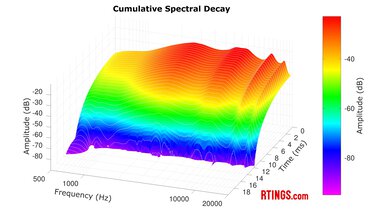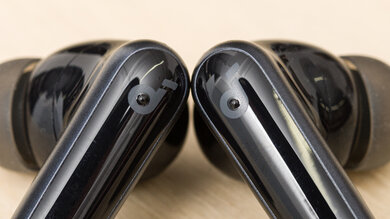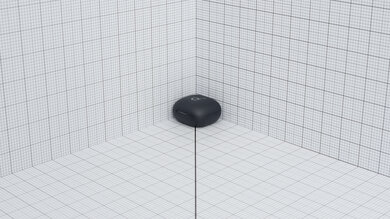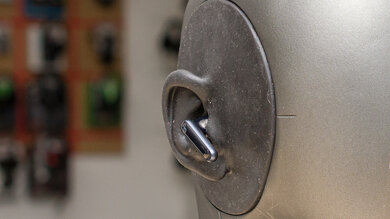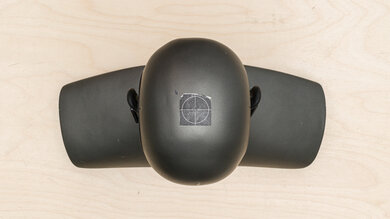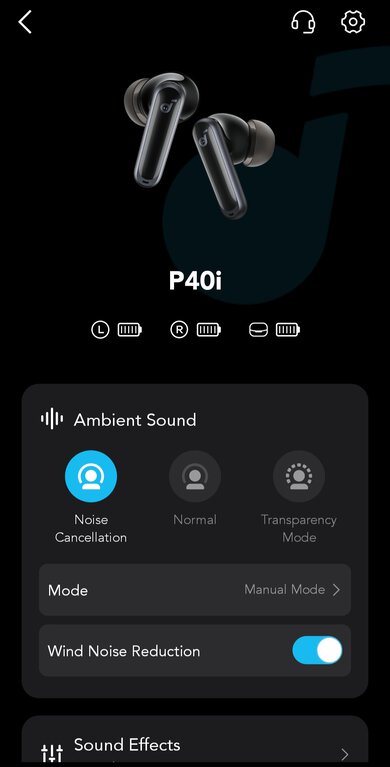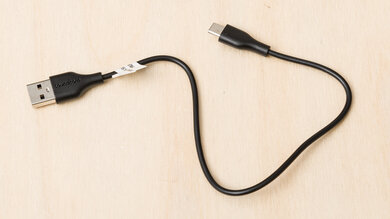The Anker Soundcore P40i are active noise cancelling (ANC) earbuds at an approachable entry-level tier. Despite their wallet-friendly price, they come with a comprehensive app that includes EQ, a 'Game Mode' for reduced latency, and a long battery life. As the bigger sibling to the non-ANC Anker Soundcore P25i, let's see if they're worthwhile.
Our Verdict
The Anker Soundcore P40i are very good for sports and fitness, provided they fit you. Their IPX5 rating means they can handle water splashes if you take them for a run in the rain. They feel comfortable, although they lack wings or stabilizers, so their fit is looser, but these headphones are stable (for most people) even if they require readjustments. Onboard controls are intuitive and comprehensive, and you can use both 'Ambient' mode and the wind reduction control for awareness during outdoor exercises.
-
IPX5 rating.
-
Stable and lightweight in-ears.
-
Fit can require readjusting.
The Anker Soundcore P40i is a good choice for travel. They have a nine-hour continuous battery life with an additional four charges in the case. They're comfortable and stable to wear, and their connectivity is excellent. Meanwhile, they're small enough to fit in most pockets so that you can travel light. They also have great ANC, so noise like rumbly bus and plane engines will be well mitigated. On the other hand, they can leak some of your audio, which is less of an issue on a daytime commute than on a red-eye flight if your neighbor is trying to sleep.
-
Long battery life.
-
Great ANC performance.
-
Audio can leak.
The Anker Soundcore P40i are decent for the office. They feel comfortable and fit a bit looser, which is fine for working at a desk. Their battery life with ANC enabled will get you through the workday. Plus, their multi-device pairing makes it easy to switch between your phone and your work PC. The onboard mics aren't spectacular, and call controls are limited, but they're serviceable for the occasional call. Their ANC also has you covered, attenuating noise from ventilation systems and ambient office chatter.
-
Long battery life.
-
Great ANC performance.
-
Audio can leak.
-
Poor mic recording quality.
The Anker Soundcore P40i aren't ideal for wireless gaming due to their latency. You can enable 'Game Mode' in the Anker Soundcore app, which reduces the audio/visual desync, but it'll still be noticeable.
The Anker Soundcore P40i are Bluetooth wireless earbuds, so you can't use them wired.
The Anker Soundcore P40i have okay audio reproduction accuracy. Their frequency response deviates little from their bass-boosted sound profile, with fluctuations localized to the treble veiling detail or brightening sibilants depending on the pitch. The L/R drivers are decently well-matched for everyday listening—slight mismatches in the mid-range will, at worst, create small gaps in the stereo image. While there are more pronounced phase mismatches in the upper range, we lose sensitivity in this range over time, so you likely won't perceive less precise positioning of audio objects. Group delay is a different story, with timing differences between adjacent bands in the bass signaling significant phase shifts that contribute to the inflated bass in the frequency response. While the earbuds produce harmonic distortion at high levels, in practice, you likely won't be listening to anything loud enough in the mids and treble to cause perceivable distortion. Because the earbuds bypass the pinna, they won't improve immersion through outer ear interactions.
The Anker Soundcore P40i are great for noise isolation. While their ANC system has 'Scenes' to cycle through depending on your environment, they don't meaningfully affect the earbuds' isolation performance—they easily attenuate noise from bustling streets to crowded subway stations. In the other direction, the headphones leak a bit of audio with a tinny version of your audio exceeding the noise floor of a calm room.
The Anker Soundcore P40i have a middling microphone. Your voice will sound distorted and thin on calls. In the loudest conditions, the microphones separate noise decently but can cut out parts of your speech.
The Anker Soundcore P40i are excellent for frequency response consistency. Generally speaking, your audio will sound the same between different uses, regardless of your physical characteristics. The only caveat is that the fit can loosen over time, especially if you have larger ear canals, so they might require some readjustment after initially establishing a seal.
- 7.9 Sports And Fitness
- 7.6 Travel
- 7.0 Office Work
- 5.3 Wireless Gaming (In Development)
- 5.1 Wired Gaming (In Development)
Performance Usages
- 6.7 Audio Reproduction Accuracy
- 8.0 Noise Isolation
- 5.9 Microphone (In Development)
- 8.9 Frequency Response Consistency
Changelog
-
Updated Apr 25, 2025:
This review has been updated to Test Bench 2.0, which adds the following tests: Stereo Mismatch, Group Delay, Cumulative Spectral Decay, PRTF, Harmonic Distortion, and Electrical Aspects. We've added new performance usages and updated the text throughout the Sound tests and side-by-sides.
- Updated Apr 25, 2025: We've converted this review to Test Bench 2.0, which updates our sound tests and adds performance usages. You can read more about this in our changelog.
-
Updated Feb 07, 2025:
We've updated the Noise Isolation - Full Range, Common Scenarios, Voice Handling, and ANC Wind Handling sections following an update to firmware 01.67.
-
Updated Dec 16, 2024:
Several Sound tests have been updated following Test Bench 1.8. There have also been text changes made throughout the review, including to the usages and product comparisons to match these results.
- Updated Dec 09, 2024: We've converted this review to Test Bench 1.8, which updates our target curve and Sound tests. You can read more about this in our changelog.
Check Price
Differences Between Sizes And Variants
The Anker Soundcore P40i come in four different colors: Black, Blue, Purple, and White. You can see the label for our unit, which is the 'Black' model. We expect these to all perform similarly. If you encounter a different variant of these headphones, please let us know in the comments below, and we'll update our review.
Compared To Other Headphones
The Anker Soundcore P40i feature noise cancelling, which is similarly effective compared to the Anker Soundcore Space A40 Truly Wireless or the Anker Soundcore Liberty 4 NC Truly Wireless. Unlike the less expensive Anker Soundcore P25i, the P40i includes ANC. Meanwhile, the JBL Tune Buds True Wireless also come with ANC at a similar price point, though it's not nearly as effective as that of the Anker. Having built a reputation for delivering powerful noise cancellation at wallet-friendly prices, Anker delivers on the standards they've set with the P40i.
On that note, check out the best budget noise cancelling headphones, the best budget and cheap wireless earbuds, and the best noise cancelling earbuds for other products that might suit your needs.
The CMF Buds Pro 2 and Anker Soundcore P40i are both affordable ANC earbuds with different strengths and deficits. Both are bassy, but depending on your tastes, the CMF sound a bit more balanced with a warmer treble, while the Anker have a much more excited sound profile, which depends on your preferences. You can EQ either. The CMF have a more accurate-sounding microphone system that filters out background noise a bit better. They also let you use the LDAC codec for Hi-Res audio files. Meanwhile, the Anker boast a longer continuous battery life and a lower latency performance. The Anker also feel a little more comfortable with more ear tips to find your fit.
The Anker Soundcore Liberty 4 NC Truly Wireless and Anker Soundcore P40i perform similarly with mostly minor differences. The Liberty 4 NC support LDAC for high-quality audio. Meanwhile, the P40i have significantly lower latency when you use them in 'Game Mode.' The P40i also have an IPX5 rating, which certifies better protection against water exposure than the IPX4 rating found on the Liberty 4 NC buds. Otherwise, they both have very similar app functionality.
The Anker Soundcore Space A40 Truly Wireless are quite similar to the Anker Soundcore P40i. Both the A40 and the P40i can isolate you from noise quite well. The A40 leak less audio and support the high-quality audio codec, LDAC. However, the P40i have a slightly longer battery life and are more stable. The buds also have somewhat better water resistance with an IPX5 rating instead of the IPX4 found on the A40. They otherwise share many of the same app features, such as a graphic EQ and 'Game Mode' to reduce latency.
The Anker Soundcore P25i are slightly more stripped down than the Anker Soundcore P40i. The P25i lack active noise cancelling and only use the passive isolation provided by their ear tips and fit. They both use the same app with an equalizer and low latency 'Game Mode.' They also share the same IPX5 rating against water splashes with similar continuous-use battery performance. However, the P40i have ANC, which makes them much more performant when dealing with background noise. The P40i also support multi-device pairing, and their case stores four charges versus the P25i's two charges. Still, the choice likely depends on whether you want noise cancelling and your budget.
The Anker SoundCore Life P3 Truly Wireless and Anker Soundcore P40i are both earbuds with a solid ANC system. The P3 deliver more consistent audio and leak less audio into the room. Meanwhile, both earbuds share similar in-app features like EQ and virtual surround sound, as well as an IPX5 rating against water splashes. One upside of the P40i is their continuous battery life, which is over nine hours compared to the P3's 5.7 hours of battery.
Test Results
The Anker P40i have a bass-boosted sound by default, which is also called 'Soundcore Signature' if you use their EQ—their sound is simultaneously quite bright and bassy, though the bass emphasis significantly outshines the treble.
If this tuning doesn't work for you and you'd prefer to make some tweaks, you can adjust the earbuds' sound using presets or the app's graphic EQ. You can toggle Anker's BassUp feature, which is common in most Anker products. We've taken measurements of the main five of the 23 presets in the EQ section, and you can also create your own custom EQ profile. These headphones sound very slightly different with ANC turned on or off.
These have excellent frequency response consistency. You can expect your music to sound nearly the same with each use. If you have smaller ears, you'll have an easier time getting consistent audio delivery during a session because the size and shape of the buds can cause them to slowly inch out of larger ears over time, resulting in a temperamental seal.
Their bass target compliance is middling. The entire range is hugely inflated, so your audio will sound very thumpy and boomy. That said, fans of genres like EDM might appreciate this sound.
Their midrange target compliance is great. They're flat through most of the low and mid-mid, so instruments and vocals sound natural and well-balanced. That said, the high-mid adds a bit of harshness to higher vocal parts and solo instruments. However, the emphasis on the bass and treble regions can obscure much of the mid-range's clarity.
The Anker Soundcore P40i's treble target compliance is acceptable. Virtually the entire range is exaggerated, though the low treble is fairly evenly exaggerated, lending proportionate intensity to the presence and articulation of vocals. That said, the mid-treble is noticeably more piercing and painful. Songs like Enjoy the Silence by Depeche Mode can sound, to quote the lyrics, 'painful to me' (and you) over prolonged listening sessions as the sibilants of the reverb-drenched vocals over-emphasize Dave Gahan's Ss and Ts, all while making the constant drum machine's hi-hats harsh.
The peaks and dips performance of the Anker Soundcore P40i is very good—the earbuds' frequency response adheres to the their bass-boosted sound profile. The bass and mid-range are especially well managed, with minimal sudden deviations. That said, the treble range has greater variation. The small dip in low-treble veils articulation and detail just a touch, while a major peak in the mid-treble makes the harmonics of cymbals piercing.
The headphones' L/R driver matching is good. Their amplitude and frequency response mismatch are within good values, with minor mid-range driver imbalances that are unlikely to be audible in everyday listening—at worst, creating small gaps in stereo positioning for lead vocals or instruments. Meanwhile, the drivers' phase responses deviate from one another primarily in the mid- and high-treble. As we lose sensitivity to this range over time, the deviations are unlikely to be audible in regular content, though you may perceive less precise positioning of audio objects like instruments.
The group delay performance is sub-par. The timing difference of low-bass frequencies relative to neighboring frequencies is indicative of a significant phase shift of the affected frequencies, introducing both additive and destructive wave effects that contribute to the headphones' inflated bass frequency response. The treble range remains transparent in regular content, but you may notice looser bass.
Like most in-ears, the Anker Soundcore P40i bypass your outer ear by design, which limits their ability to create an immersive sound through pinna interaction.
The Soundcore P40i have decent harmonic distortion performance. While there are unintended harmonics generated in the bass at high levels, they're not audible as we're less sensitive to lower frequencies. Although the graph shows fairly significant harmonic distortion in the mids and treble on our plot, you likely won't be listening to anything this loud, as high levels in this frequency range can be harmful to your health.
These earbuds aren't wired, so you won't need an amp to drive them.
The Anker P40i app includes a virtual surround sound feature. You get a choice of two presets, 'Movie Mode' and 'Game Mode,' to simulate a 3D audio effect by applying a digital signal processor (DSP) to whatever media is playing. It doesn't require purposely mixed media, and because it's a DSP, how pleasing and well it works will vary depending on the source material. It's not compatible with media already mixed for 3D or spatial audio. The feature also doesn't offer head-tracking or room simulation.
These are the settings used to test these headphones. Our results are only valid when used in this configuration.
The Anker Soundcore P40i look like most of the brand's stemmed earbuds. They're plastic, stemmed, and monochrome. Unlike the Anker Soundcore P25i, these buds feature a raised section along the stem so you can feel a tactile difference between the touch-sensitive pad and the rest of the housing. Otherwise, their case is a relatively short, matte plastic affair with a clamshell lid. The case has a pop-up phone stand that's novel but not groundbreaking compared to propping your phone against any items you might have in your pocket. You have your pick of 'Black,' 'Blue' (a standard navy shade), 'White,' and 'Purple.' 'White' looks more like cream than the titanium white we're all familiar with from Apple products, and 'Purple' is a very pale blueish mauve.
These buds are comfortable. They feature five pairs of oblong silicone ear tips with grilles built into them for slightly easier cleaning. Like most earbuds, they're lightweight, and the smooth, glossy plastic feels fine against your skin. Despite a pretty good selection of ear tip sizes, they tend to have a loose fit that requires periodic readjustments as they slowly shift outwards over time. If you have larger ear canals or find it trickier to get a reliable fit compared to others, these can pose challenges.
The Anker Soundcore P40i have good controls. Their touch-sensitive surface is easily located by feeling along the raised and glossy section of the earbuds' stems. You can see the default control settings and which commands you can remap the gestures to here. For instance, most people will want to add a volume control, which isn't available by default. You get a good variety of gestures per bud, single, double, and triple taps, plus press-and-hold, but call functions are more minimal. Unlike even more upscale earbuds like the Samsung Galaxy Buds2 Pro, you aren't restricted to the same 'type' of functions being bound to each earbud with the same gesture, so for instance, you can allocate 'skip track ahead' on the left earbud with a double tap. Double tap can be anything on the right earbud, like voice assistant, if you want.
By default, the buds chime when you tap them, when you enter ANC listening mode, and if you max out the volume. Otherwise, they lack voice prompts and don't chime for other functions, and the latter is more down to personal preference because not everyone wants to hear a chime during music playback. It can feel like a lengthy process to enter taps because they don't respond quickly. That's not a dealbreaker for everyone, but it's worth noting if you're easily annoyed when interfacing with touch commands or if you're trying to skip back to a previous track (a command that always has a very narrow and finite time window).
The Anker Soundcore P40i charging case is very good. Its lid is firmly attached, and the hinge has no unwanted lateral play. The white LED indicators show the battery statuses of each earbud, and the case can charge wirelessly on a Qi pad.
A novel feature of the case is that it has a built-in phone stand, which can hold your phone horizontally and only when the case is open. This can be a nice feature if you're on a flight or in a cafe and want to watch media hands-free, but it's pretty simple, as you can see here. It also only works with your device in the horizontal orientation, and you can't adjust the angle, so its utility is slightly limited. Still, it's a cute addition.
The Anker Soundcore P40i build quality is good. The buds have an IPX5 rating against water splashes, so you can comfortably wear them outside in the rain (just wipe them off before popping them back in the case). They're plastic—not super dense plastic, but not at all brittle or cheap-feeling. The case has a secure lid and hinge. However, our unit's case has a pungent and unpleasant chemical smell when it's opened. Yours might not smell, but it's worth mentioning, especially if you're sensitive to scents.
The Anker Soundcore P40i buds have a stable in-ear design. You can take them for a walk and light exercise, though they need occasional adjustment. Their five sets of ear tips offer options for honing their fit, and their overall lightweight build means their mass is well-distributed. However, it can be more difficult to get a perfect fit if you have uniquely shaped ears. They also don't fit deeply in your ears, so if you're looking for an ultra-secure earbud, you'd probably prefer another pair with stabilizers like the Samsung Galaxy Buds FE.
The Anker Soundcore P40i have great full-range noise isolation. Their recent firmware, 01.67, significantly improved their performance to external sounds. These earbuds passively handle treble and upper mid-range noises like chirping birds. Meanwhile, their ANC improves mitigation in the bass up to the mid-mid frequencies, attenuating noise from large vehicle engines and ambient chatter.
All that said, the earbuds have a couple of ANC settings you can cycle through. The app has 'Scenes,' which are meant to adjust the ANC based on your environment but don't make an enormous difference.
These buds do an impressive job of isolating you from noise in common scenarios. They handle street noise effectively, mitigating the sounds of rumbly bus engines and pneumatic brakes. Background chatter in offices and squeaky reclining chairs are also handled well by these headphones' ANC and passive isolation. The ambient din of airplane cabins is also handled well by their isolation performance. That said, there are some frequency bands with less attenuation; in office settings, barely audible footsteps on hardwood floors may slip through the Anker headphones' ANC system.
The Anker P40i have a wind reduction mode, which helps to improve its ANC system's effectiveness by reducing the 'anti-noise' created when wind interacts with mics and the ANC system. However, the mode's performance still varies depending on the angle at which the wind is blowing. Additionally, leaving the mode on when conditions aren't windy can impact the ANC's overall performance. Interestingly, you can leave 'Ambient' mode and wind reduction mode on simultaneously and still experience a reduction in overall noise level compared to all settings disabled.
The Anker Soundcore P40i leakage performance is decent. Largely due to their loose fit, your audio is more likely to escape. While leakage depends on how loud your volume is set, at moderate listening levels, the trebly content of your audio will be audible in an office as a thin representation of your music. If you have a desk that's not too close to coworkers, this won't bother anyone, but it's not as private as the Anker Soundcore Space A40 Truly Wireless.
The Anker P40i's microphone system's recording quality is poor. Your voice sounds a bit distorted and thin. While speech is still intelligible, it's not very clear or true to life.
Their noise handling performance is decent. When background noise is present, the mic system prioritizes your speech; even if background noise remains audible, it's quieter than your speech. With irregular and sudden noises, the mic can reject most unwanted noise well but can also cut out small segments of your own speech. Still, at least the caller isn't subjected to unexpected and loud noise.
Their battery performance is great. According to our tests, you get over nine hours to a single charge with ANC enabled, though this can vary depending on use. They take about 45 minutes to charge up completely. The case supplies an additional four charges. They have an auto-off timer to conserve the battery, which you can adjust in the companion app. According to the manufacturer, a 10-minute charge can allow the buds to last five hours. You can also use one earbud in mono while the other charges in the case.
The Anker Soundcore app is impressive. It's the same app that most of the products by the brand use as you can see here, with an extensive EQ, listening mode controls, and features like 'Game Mode' to reduce latency. Other features include an auto-off timer, control remapping, virtual surround sound modes, a decibel limiter, Find Devices, and management for switching between two paired devices.
You can't use these earbuds wired; they only work over Bluetooth. Their USB-A to USB-C cable is for charging their case.
The Anker Soundcore P40i have excellent Bluetooth connectivity. They support multi-device pairing with two devices at a time. Through their app, you can access different listening modes like Game Mode,' which effectively reduces the SBC codec's latency to the figure shown. That said, the latency in 'Game Mode' is still noticeable, even though it's a major improvement over the standard connection's latency which is roughly double the delay of 'Game Mode'. Despite its name, 'Movie Mode' does not reduce latency for better-synchronized audio and video. Instead, it creates an immersive listening experience with its virtual soundstage, but the lipsync mismatch is bad enough to get annoying. Of course, latency varies depending on your device, apps, and connection strengths. These buds use pretty standard AAC and SBC codecs, unlike the Anker Soundcore Liberty 4 NC Truly Wireless, which support LDAC for higher-quality audio.
You can only connect these earbuds to a Bluetooth-compatible PC for full audio and microphone support.
Comments
Anker Soundcore P40i: Main Discussion
Let us know why you want us to review the product here, or encourage others to vote for this product.
Update: This review has been updated to Test Bench 2.0, which adds the following tests: Stereo Mismatch, Group Delay, Cumulative Spectral Decay, PRTF, Harmonic Distortion, and Electrical Aspects. We’ve added new performance usages and updated the text throughout the Sound tests and side-by-sides.
- 21010
What is the recorded latency when game mode isn’t enabled? I would appreciate it if you can share this info if it’s available :)
Hey, so without game mode enabled, we measured 283 ms over SBC (the default codec). Of course, that can vary with different devices and apps, but it’s still greater than the 133 ms we measured with game mode under the same test conditions.
- 21010
What is the recorded latency when game mode isn’t enabled? I would appreciate it if you can share this info if it’s available :)
Update: We’ve updated the Noise Isolation - Full Range, Common Scenarios, Voice Handling, and ANC Wind Handling sections following an update to firmware 01.67.
- 21010
So I just got the p40is and I think your testing is either flawed or the firmware update my headphones did helped with ANC. I tested frequencies from 10-500hz and I saw a huge drop in volume across them all(at least 10db if not 20db). 10hz for example i can’t even hear with the headphones ANC on with no audio playing. But your graph shows no ANC db drop below 500hz on the p40i. The earbuds are a strange oval shape on these so maybe fitment was an issue? Either way, ANC is better than the graph shows here(so long as your ear fitment is decent). For clarification I’m using auto mode so it adjusts depending on how loud the environment is with wind noise reduction enabled. Hello 0xsergy,
Thank you for letting us know, we will look into the latest firmware for the P40i. We will update the review if required.
- 21010
So I just got the p40is and I think your testing is either flawed or the firmware update my headphones did helped with ANC. I tested frequencies from 10-500hz and I saw a huge drop in volume across them all(at least 10db if not 20db). 10hz for example i can’t even hear with the headphones ANC on with no audio playing. But your graph shows no ANC db drop below 500hz on the p40i. The earbuds are a strange oval shape on these so maybe fitment was an issue? Either way, ANC is better than the graph shows here(so long as your ear fitment is decent). For clarification I’m using auto mode so it adjusts depending on how loud the environment is with wind noise reduction enabled.
Update: Several Sound tests have been updated following Test Bench 1.8. There have also been text changes made throughout the review, including to the usages and product comparisons to match these results.


